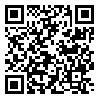Volume 11, Issue 2 (2021)
ORMR 2021, 11(2): 115-143 |
Back to browse issues page
Download citation:
BibTeX | RIS | EndNote | Medlars | ProCite | Reference Manager | RefWorks
Send citation to:



BibTeX | RIS | EndNote | Medlars | ProCite | Reference Manager | RefWorks
Send citation to:
andalib ardakani D, toghroljerdi A. Identify, rank and model the factors affecting the non-implementation of social responsibility. ORMR 2021; 11 (2) :115-143
URL: http://ormr.modares.ac.ir/article-28-48174-en.html
URL: http://ormr.modares.ac.ir/article-28-48174-en.html
1- Assistant Professor, Departement of Industrial Management, Faculty of Economics, Management and Accounting, Yazd University, Yazd, Iran. , andalib@yazd.ac.ir
2- MA, Departement of Industrial Management, Faculty of Economics, Management and Accounting, Yazd University, Yazd, Iran.
2- MA, Departement of Industrial Management, Faculty of Economics, Management and Accounting, Yazd University, Yazd, Iran.
Abstract: (2740 Views)
Implementing social responsibility has created a positive outlook and competitive advantage for companies. They are under constant pressure from employees, suppliers, community groups, NGOs and the government to increase their participation in the legal activities of the community. In this regard, companies operate beyond economic and social responsibilities. However, companies face barriers to implementing social responsibility, and improper implementation and disregard for these barriers not only do not create a competitive advantage for companies, but also waste resources. Therefore, the purpose of this study is to rank and model barriers to the implementation of social responsibility. The research was conducted in four steps. In the first and second steps, the barriers to the implementation of social responsibility were identified using a study of research literature. In the third step, these barriers were ranked using the best-worst technique, which the findings show that lack of communication between stakeholders is the most important barriers to the implementation of social responsibility and in the fourth step, using a fuzzy cognitive map, the framework of barriers to the implementation of social responsibility was presented. Finally, according to the framework designed for barriers to the implementation of social responsibility, the scenarios was written. By examining different scenarios, the results showed that as the impact of company culture increases, other factors also increase; However, reducing the impact of lack of top management support makes the relationship between cost-effectiveness analysis and cost-effectiveness negative.
Keywords: Implementation of Corporate social responsibility, Barriers of Corporate Social Responsibility, Best-Worst method, Fuzzy cognitive map analysis.
Article Type: Original Research |
Subject:
Strategy and Management
Received: 2020/12/6 | Accepted: 2021/04/13 | Published: 2021/08/30
Received: 2020/12/6 | Accepted: 2021/04/13 | Published: 2021/08/30
Send email to the article author
| Rights and permissions | |
 |
This work is licensed under a Creative Commons Attribution-NonCommercial 4.0 International License. |







